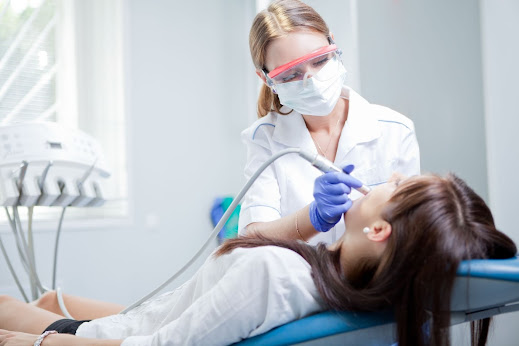5 Effective tips for Dental Care and Oral Health
Maintaining optimal oral health is essential for a confident smile and overall well-being. From proper brushing techniques and choosing the right toothpaste to understanding the significance of regular check-ups, these expert-backed tips will empower you to prioritise your best dental care west Auckland-wide. Discover actionable advice that will contribute to stronger teeth, healthier gums, and a happier you.
Tip 1: Brushing Techniques
Brushing your teeth is, of course, the foundation of good oral hygiene. However, it's not just about scrubbing your teeth haphazardly. There is a correct brushing technique that you should follow to ensure effective cleaning.
First, choose a toothbrush with soft bristles that can reach all areas of your mouth comfortably. It is recommended to brush your teeth at least twice a day, once in the morning and once before bed. Using fluoride toothpaste is essential as it helps protect your teeth against cavities and strengthens enamel. Remember, brushing for at least two minutes is necessary to thoroughly clean your teeth and gums.
While brushing is crucial, it's important to avoid common mistakes that can hinder your dental care west Auckland efforts. One common mistake is using too much pressure while brushing, which can lead to gum recession and enamel erosion.
Tip 2: Flossing Made Easy
Brushing alone is not enough to remove all the plaque and food particles from between your teeth. This is where flossing comes in. Flossing is a vital part of maintaining oral hygiene as it helps reach areas that your toothbrush can't.
To floss effectively, start by taking about 18 inches of dental floss and wrap it around your middle fingers, leaving about two inches of floss between them. Hold the floss tightly between your thumbs and forefingers and gently glide it between your teeth using a back-and-forth motion. Make sure to curve the floss around each tooth in a C shape to remove any debris.
If traditional flossing is difficult for you, there are alternative options available. Interdental brushes are small brushes that can easily fit between your teeth and effectively remove plaque.
Water flossers, which use a stream of water to clean between teeth, are another great option. Find the method that works best for you and incorporate it into your daily routine.
Tip 3: Healthy Eating Habits for a Healthy Smile
Your diet plays a significant role in your dental health. Consuming tooth-friendly foods and beverages can help prevent tooth decay and maintain a healthy smile. Incorporate foods rich in calcium, such as dairy products, leafy greens, and almonds, as they help strengthen your teeth.
Avoiding sugary and acidic foods and drinks is also important. These substances can cause tooth decay and damage enamel. If you do indulge in sugary or acidic treats, try to consume them in moderation and rinse your mouth with water afterward to neutralise the acids.
Drinking plenty of water throughout the day is also beneficial for your dental health. Water helps wash away food particles and keeps your mouth hydrated, reducing the risk of dry mouth and bad breath.
Tip 4: Regular Dental Check-ups and Cleanings
While maintaining good oral hygiene at home is crucial, it's equally important to seek professional dental care regularly. Even if you have impeccable dental care habits, there are areas in your mouth that are difficult to clean on your own.
Regular dental check-ups and cleanings allow your dentist to examine your teeth, gums, and mouth for any signs of dental issues. They can also provide professional cleanings to remove plaque and tartar buildup that cannot be effectively removed with regular brushing and flossing.
Ideally, you should visit your dentist every six months for a check-up and cleaning. However, if you have specific dental issues or a history of dental problems, more frequent visits may be necessary. Remember, prevention is always better than cure when it comes to dental care.
It's not uncommon for people to experience fear or anxiety when it comes to dental visits. If you have concerns, make sure to communicate them with your dentist. They can provide reassurance and take measures to ensure your comfort during your visit.
Tip 5: Additional Practices for Optimal Oral Health
In addition to the previous tips, there are a few extra practices you can incorporate into your routine for optimal oral health.
Cleaning your tongue is a simple yet effective practice. Use a tongue scraper or your toothbrush to gently clean your tongue to remove bacteria and freshen your breath. Proper gum care is also important. Gently massaging your gums with a soft toothbrush or using an antimicrobial mouthwash can help maintain healthy gums.
Staying hydrated throughout the day is another crucial aspect of oral health. Drinking plenty of water helps stimulate saliva production, which is essential for neutralising acids and preventing dry mouth.
Conclusion
In conclusion, maintaining good dental care and oral health should be a priority for everyone. By implementing the five tips we discussed, you can ensure that your smile remains healthy and beautiful.
Remember to brush your teeth using the correct technique, floss daily, maintain a tooth-friendly diet, schedule regular dental check-ups, and incorporate additional practices for optimal oral health. By following these tips, you will be well on your way to achieving a healthy and radiant smile.
Don't forget to share these tips with your friends and family so they too can benefit from this friendly guide. Together, let's spread the importance of dental care west Auckland and oral health and help everyone achieve a smile they can be proud of.



Comments
Post a Comment